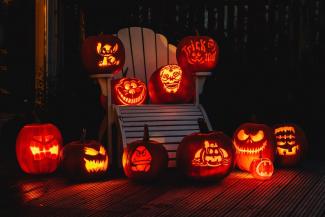
Do the preparation task first. Then read the article and do the exercises.
Preparation
The origins of Halloween
If you think of Halloween, you probably think of scary carved pumpkins, all kinds of fancy dress and children asking for sweets. And if you think of a country that celebrates Halloween, you probably think of the United States first. Americans and Canadians have adopted Halloween in a big way, but Halloween traditions actually come from 16th-century Ireland, Scotland and England.
The tradition of Halloween on 31 October comes from the ancient Celtic festival of Samhain. Samhain was the Celtic New Year and they celebrated it on 1 November because that was the end of summer and harvest time (life) and the beginning of winter (death). It was also the time for ghosts to return to earth for a day. People lit a big fire, wore special clothes made of animal skin and hoped to be safe from the ghosts and the winter. In AD 609, the Catholic Church put the Christian celebration of All Saints Day on 1 November. In AD 1000, the church added All Souls Day on 2 November, and All Hallows Eve – or Halloween – moved to the night of the 31st.
Pumpkins
The Celts carved faces into vegetables like turnips and potatoes to scare the ghosts and other spirits and make them go away. It was sometimes called a jack-o'-lantern because of an Irish story about a man, Jack. He played a trick on the devil and then had to walk the earth for all time as a punishment. Irish people who came to live in the United States in the 1800s found pumpkins much easier to carve, and the tradition became the one we see today.
Fancy dress
The Celts were afraid of the ghosts that came on Samhain. If they went outside after dark, they covered their faces with masks. They hoped any ghosts they met would think they were ghosts too and would leave them alone. In early America, the Native Americans and the first Europeans celebrated the end of the harvest, but not Halloween. When Irish people arrived, the harvest festival started to look more like Halloween and it became popular across the country. In the late 19th century, people tried to make Halloween less about ghosts and religion and more about celebrating the season with a party for neighbours and family. That’s why Americans today wear all kinds of Halloween costumes and not just scary things like witches and ghosts like in other countries.
Trick or treat
This is another tradition that began in Europe, this time in England. When the church introduced All Souls Day, rich people gave poor people 'soul cakes', a small cake made with spices and raisins. It replaced the Celtic tradition of leaving food outside houses for the ghosts. 'Going a-souling' was popular in England for hundreds of years until about the 1930s. The Americans kept the tradition, but today children knock on people’s doors and ask for sweets. Going trick or treating is so popular that a quarter of the sweets for the year in the United States are sold for this one day.
The rest of the world
Halloween has become the United States' second-biggest commercial festival after Christmas. Halloween is also celebrated in other countries, but it's not as big as in the United States, even in the countries where the traditions began. Mexico celebrates the Day of the Dead from 31 October to 2 November and some of its traditions, like giving gifts of sugar skulls, are starting to mix with Halloween. In this way, the celebration of Halloween continues to change as new traditions join the oldest of the Celtic ones.
Discussion
Language level
- Log in or register to post comments
- Log in or register to post comments
- Log in or register to post comments
- Log in or register to post comments
- Log in or register to post comments



